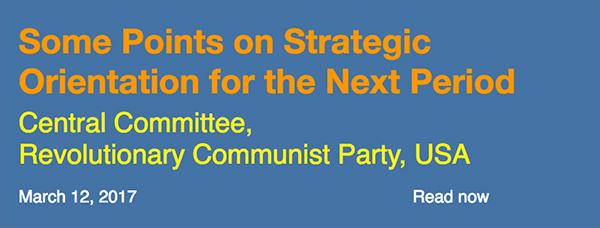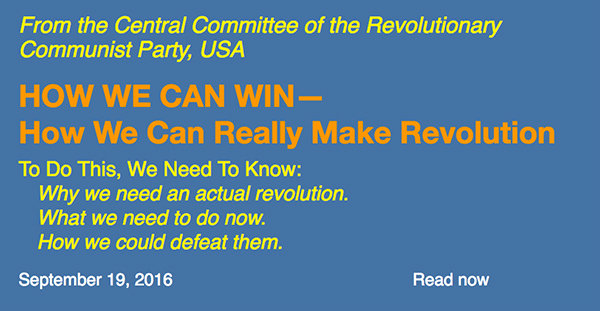From readers:
Digging into the Constitution of the Revolutionary Communist Party
On a Mission to Make Revolution!
June 23, 2017 | Revolution Newspaper | revcom.us
As supporters of the Revolutionary Communist Party, we have continued to return to the guidance from the Central Committee of the RCP, “Some Points on Strategic Orientation for the Next Period” from this March.
Part V of that document is titled “Further Points on Advancing Strategic Objectives—Re-Polarization for Revolution, Bringing Forward New Forces for Revolution.” In that section, it talks about the kind of ideological struggle that needs to be waged with people stepping into the revolution. And it makes a particular point that “Anyone in and around the club should be struggled with to prepare themselves to be in the Party, after they’ve been there for a little while—as opposed to ‘a permanent resting place.’” This is in the context of arguing that anyone in and around the Revolution Club needs to be “on a mission to make revolution!”
We’ve been getting together with people and waging ideological struggle along the lines of what’s discussed there and as part of this, we invited several members of the Revolution Club to carve out a day to get into the basic line of the RCP as concentrated in the Party’s Constitution.
To frame the discussion, a Revolution Club member began by talking about the importance of people getting clear on the need and role of the Party in making revolution. She told people that if they want revolution very badly, they have to be willing to be scientific. That means asking lots of questions and taking responsibility to understand what it means to be scientific, and to apply that science to the struggle of making revolution. Theory can be hard, and it’s very foreign to most people. She encouraged people to work out their thinking out loud and to not be shy to speak on a certain point, that’s part of people’s process to transform their thinking and to understand reality more deeply.
We opened with a discussion of the intro to the Appendix of the Constitution, “Communism as a Science.” This was important in framing the rest of our discussion, rooting us in the core breakthrough of the new synthesis of communism that BA has developed—putting communism on a more thoroughly scientific foundation. We went back to the definition of science in the interview with Ardea Skybreak, Science and Revolution: On the Importance of Science and the Application of Science to Society, the New Synthesis of Communism and the Leadership of Bob Avakian. There was a lot of emphasis given to the importance of understanding that science is a process and a mode of thinking, and not a set of precepts or conclusions that you have to memorize. We also talked about materialism vs. idealism, returning to the discussion of this in THE NEW COMMUNISM by Bob Avakian.
After that, we got into the whole of the Preamble of the Party’s Constitution, reading out loud together the 15 pages. We took our time in doing so, to really understand and engage what it is saying, why we need a revolution and why we need a Party.
We’re not going to be able to do justice to the whole of our discussion here as we got pretty deeply into different parts of this, but will highlight a few particularly important parts of the discussion.
People spoke powerfully to the first part where it talks about private appropriation of socially produced wealth and why it does not have to be this way. We talked about all the lopsidedness in the world and the unnecessary suffering that flows from this. One Revolution Club member talked about being in the supermarket, grocery shopping and looking at the meat section and rows and rows and piles of meat that the supermarket has for sale. He said he stood there—in a nearly empty supermarket with all this meat—and thought about the tens of thousands of supermarkets across the country with full aisles just like this. He said he just thought about how much of that meat goes to waste, but also just how much excess there is here as compared to people all around the world who are starving. We know how to solve all this—to deal with this kind of lopsidedness, but this system is in the way. A system where all this production, all this excess, has to go where a profit can be made—not where people’s needs are.
There was a lot of heartfelt exposure and outrage around this, rooted in the understanding that this suffering is so completely needless. At the same time, a lot of what people were speaking out around was the contradiction of the uneven distribution of all this material wealth—which is a real and howling contradiction. But even there, we need to go deeper into the question of the exploitative production that this fucked up distribution is bound up with. This led to some discussion of political economy and the underlying workings of capitalism-imperialism.
We got into a discussion of the need for the dictatorship of the proletariat—how to understand what is meant by dictatorship and democracy. Why, under socialism, you need a state—but the need for it to be a radically different kind of state. This then led into a whole discussion of different contradictions that will be faced under socialism. We talked about how wages would be worked out, the struggle to break out of commodity production and exchange—and yet the fact that you can’t do this overnight. Someone else brought up questions of art in a socialist society. One person in the Revolution Club talked about the struggle for art to break beyond the bounds of “what will sell.” He’s been struggling with an artist he knows to get active around driving out the regime and he described being frustrated because his friend said he doesn’t want to offend anyone with his art, and he wants to build his artist name up and make money. We separated out the fact that not all art needs to be “political,” but he has been struggling with his friend to make his art radical and make a statement—and definitely not be constrained by the calculations of profit. We talked more about how, on the basis of the solid core of the Party’s Constitution and the struggle to get to communism, so much more debate and ferment could get uncorked in opposition to the stultifying commodification bound up with everything in our society.
In the context of discussing the need for a Party—but also the struggle within the Party, whether it’s in power or before it’s seized power—we got into a question that BA poses in THE NEW COMMUNISM. He asks, why is it important to join the Party even as it’s had to have, and is continuing to wage a Cultural Revolution within the Party? We’d been having discussion of the material basis for this—as it’s spoken to in the Constitution, “the pull to settle in.” But we also got into this in some specifics: that because of the work he’d been doing for decades on the most urgent questions of making revolution and emancipating humanity—developing the new synthesis of communism—BA had come to concentrate whether this was going to be a revolutionary party or a “residue of the past.”
One Revolution Club member spoke to this question in very moving ways. She talked about the masses of people who are constantly told in a million different ways that they ain’t shit and don’t have shit! And the only way out for people is through this revolution. To make this revolution, we need this Party. She talked about the need to be scientific and applying that to making revolution to keep this Party on the road it needs to be on and then she read from THE NEW COMMUNISM, from the section on “The Cultural Revolution Within the RCP.” And then quoted BA where he speaks to whether the Party will be a vanguard of the future or a residue of the past. She spoke passionately about this, saying when she first read this it broke her heart because it made her think of the masses and the fact that the most precious thing they have is this Party, and if this Party goes on a different road the masses of people really won’t have shit, they will be stabbed in the back once again! We can’t allow that and it is our responsibility—the responsibility of the masses, whether you’re in this Party or not—to struggle to keep this Party on the revolutionary road it needs to be on to really emancipate all of humanity.
This was a heavy thing for everyone in the room—really appreciating what the stakes are, and what everyone’s responsibility is in this, if you hate the way the world is and see the basis to change it through revolution.
This led into some lively discussion of what it means to be a strategic commander and what gets in the way of people playing that role. We talked about the importance of political and ideological struggle—with each other and the masses. And how that is a necessary part of being scientific. One person talked about how the first time someone in the Club struggled with them, they took it personally. But then they had to really think about—was this person right or wrong? And if they were right, why aren’t I happy to have that pointed out? We talked about ego and the material basis for ego in the system of commodity production and exchange, where your ideas become a form of property that find their place on the market. We talked about how much this gets in the way of the scientific method and the need to get rid of all that in our thinking. While this wasn’t in the Constitution per se, it was really important to get into—this individualism really is a big ideological block in the world today and it’s something we have to wage a big ideological struggle against. It comes back to what BA begins THE NEW COMMUNISM with: “for whom and for what” are we going to base ourselves on and fight for?
After this, we continued to get into the rest of the Constitution—where we talked some about the strategy for revolution, speaking briefly to a question someone asked about what is a revolutionary crisis. We also had a whole discussion of the United Front Under the Leadership of the Proletariat, which was a newer phrase for some people. We talked about the need and material basis to bring forward all these people—from all different strata—in this united front. One person compared and contrasted this to the nationalism and revengism that a lot of people, in particular from the more oppressed sections of society, have towards people in the middle strata. One person talked about how, at first, they didn’t want to go out to students but then talked about how wrong that is. We also read from the section of “HOW WE CAN WIN—How We Can Really Make Revolution“ on who this revolution is for, and talked about why that is—having to do both with the need to make an actual revolution, and what is required for that, but also because of where this revolution is aiming to go—breaking ALL the chains.
This was an important and really rich discussion. We left with a plan to get into Part 2 of the Party’s Constitution, “Principles of Organization,” in several weeks. But we also told people we wanted to hear from them individually about how they are thinking about the question—and urgent need—posed by the Central Committee.
Volunteers Needed... for revcom.us and Revolution
If you like this article, subscribe, donate to and sustain Revolution newspaper.



